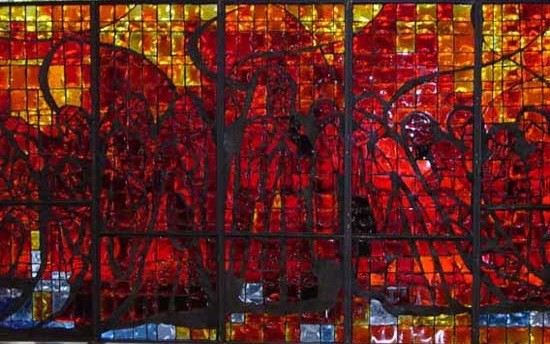I’m lying on an ice pack early this morning, doing my back exercises and listening to Pray as You Go, a tool for meditation, with monastery bells, music and a Bible reading. It warms up my cranky body — and cold morning soul. The reading today is from Acts 2, the story of Pentecost, which goes like this.
When the Feast of Pentecost came, they were all together in one place. Without warning there was a sound like a strong wind, gale force — no one could tell where it came from. It filled the whole building. Then, like a wildfire, the Holy Spirit spread through their ranks, and they started speaking in a number of different languages as the Spirit prompted them.

Jack Levison
If you are interested, Pentecost is this Sunday, which raises the question: How can I prep for Pentecost?
We know how to prep for the other big Christian holidays.
Christmas is preceded by Advent, a time to anticipate the birth of Jesus. There’s shopping, carols, maybe an Advent calendar. Advent gets us prepped for Christmas, so it’s hard to miss the holiday.
Easter is preceded by Lent, a time for introspection, culminating in Maundy Thursday and Good Friday, when we recall Jesus’ gruesome death. Lent gets us prepped for Easter, so it’s hard to miss the holiday.
Pentecost isn’t preceded. I know that doesn’t sound right grammatically. (“Preceded by what?“ you may wonder.) It doesn’t sit right theologically, either. It’s like all the air goes out of us after Easter. So we don’t have energy left to prep for Pentecost. Nothing precedes it. No Advent. No Lent. Most of us, then, don’t know how to prep for Pentecost.
That’s not entirely true.
Some churches have us wear red shirts, sweaters, and scarves — to remember fiery tongues on that first Pentecost. That takes about 30 seconds of rummaging in our closets. This hardly counts for preparation.
“We don’t have energy left to prep for Pentecost. Nothing precedes it. No Advent. No Lent. Most of us, then, don’t know how to prep for Pentecost.”
Some churches change their banners and vestments to red to mark the new season of Pentecost. That’s not our business, though, until the moment we step into the church. This, too, hardly counts for preparation.
Some people even bake Tongues of Fire cupcakes apparently.
It’s a shame, really, how little we prep for Pentecost, since this is the third huge feast of the Christian year, when we celebrate the powerful presence of the Holy Spirit.
We celebrate a cosmic shift — rushing wind filling whole houses.
We celebrate a communal shift — the whole group of Jesus’ followers “were all together in one place” when the wind blew and the fire came.
We celebrate a mission shift — all of them, women and men, “started speaking in a number of different languages.”
How do we prep for something as important as Pentecost?
First, we take care of business that might get between us and the work of the Holy Spirit. That’s what Jesus’ earliest followers did. When Jesus left, an angel barked, “Why do you just stand here looking up at an empty sky?”
“We can prepare for Pentecost by doing work that needs to be done.”
“So they left the mountain,” the story says, “and returned to Jerusalem,” to “the upper room they had been using as a meeting place.” When they got there, they figured out a way to replace Judas, who had betrayed Jesus and then taken his life by suicide.
We can prepare for Pentecost by doing work that needs to be done. Preparation is practical.
Second, we pray — with other people, if we can. That’s what Jesus’ earliest followers did. When they got to that upper room in Jerusalem, they prayed. Not happenstance prayers. Not occasional requests. The Greek is forceful here: “They devoted themselves all together in prayer.” That’s why Eugene Peterson, in The Message, translates the Greek like this: “they agreed they were in this for good, completely together in prayer.”
We can prepare for Pentecost by praying hard and, when we can, together. Preparation is spiritual.
Third, we get over our petty hang-ups about who can do what in the church. There was a state of emergency in the early church. Jesus was gone! It was no time for propriety, no time to decide whether women could pray or not, whether women could preach. Of course they could. They did! So the line about prayer continues: “They agreed they were in this for good, completely together in prayer, the women included.” Men and women, praying women and men, went on to receive the Spirit and preach in different languages on the day of Pentecost.
“It was no time for propriety, no time to decide whether women could pray or not, whether women could preach. Of course they could.”
We can prepare for Pentecost by realizing there is a state of emergency in our world — in our churches, too — so we can’t stall over the usual issues that dog us. Preparation is urgent.
So how do we prep for Pentecost?
- We take care of business. That’s practical.
- We pray. That’s spiritual.
- We set our priorities straight. That’s urgent.
Do this, and on Sunday morning, you’ll be ready. Maybe even ready for a flash of wildfire, the Holy Spirit, to spread through your ranks.
Jack Levison holds the W.J.A. Power Chair of Old Testament Interpretation and Biblical Hebrew at Perkins School of Theology at Southern Methodist University. He is known for his groundbreaking work on the Holy Spirit and topics both biblical and theological. An earlier version of this column appeared in Huffington Post in 2016.
Related articles:
Tower of Babel or Pentecost? The Church must not turn a deaf ear to cries for justice. | Opinion by Emmitt Drumgoole
Pentecost and the (Un)Holy Land | Opinion by Paul Robeson Ford

